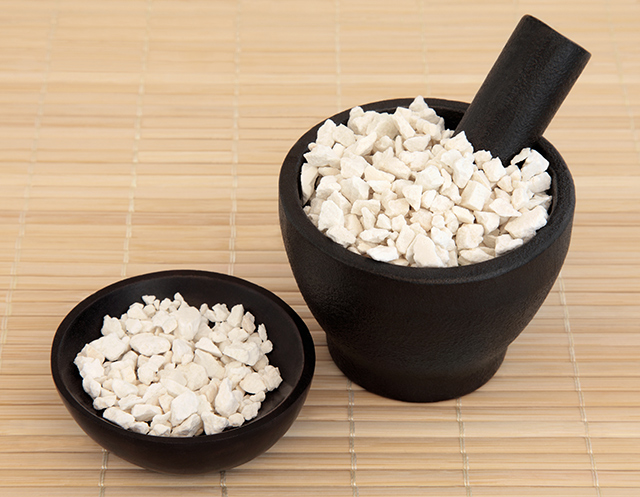Ever heard of poria? This little-known mushroom is a powerful superfood that offers a wide range of immune actions
12/02/2018 / By Zoey Sky

Poria (Wolfiporia extensa) is a mushroom that’s widely used in traditional Chinese medicine (TCM). However, while this potent natural remedy is very common in Asia, it’s mostly unknown in Western countries.
What is Wolfiporia extensa?
The poria mushroom is called by various names:
- China root
- Daedalea extensa
- Fu ling
- Hoelen
- Indian bread
- Macrohyporia cocos
- Macrohyporia extensa
- P. cocos
- Pachyma cocos
- Poria cocos (F.A.Wolf)
- Sclerotium cocos
- Tuckahoe
- W. extensa
- Wolfiporia
- Wolfiporia cocos
Poria is a saprophytic fungus, which means it lives on dead organic matter. The mushroom grows on pine tree roots, and it has a sclerotium or a large potato-shaped formation. The sclerotium can grow as large as 30 centimeters long and one kilogram in mass.
Poria has a soft and elastic texture while its flavor is bland and sweet. Once harvested, the mushroom is dried in the shade — different parts of the fungus used in Chinese medicine, like the bark (fu-ling-pi), the middle white layer (bai-fu-ling), the core (fu-shen), and the outermost reddish layer (chih-fu-ling).
In traditional Chinese and Japanese medicine, poria is used for “draining dampness.” The fungus was also used to address insomnia, balance electrolytes, and invigorate the spleen. It is called “the medicine of immortality.” Poria is used as an ingredient in at least 10 percent of the medicinal preparations included in the 2000 Pharmacopoeia of the People’s Republic of China.
Poria’s immune activities
Scientific research on the poria mushroom usually involves its kidney and immune activities. According to a growing number of studies, the fungus has an impressive range of immune actions, such as:

- Anti-bacterial
- Anti-cancer
- Anti-inflammatory (inhibiting 5-LOX, elastase, and leukotriene B4)
- Anti-tumor
- Immuno-modulatory
The mushroom’s specific immune actions include increasing T-cell count, macrophage activation, and stimulating interferon production. The bulk of studies on poria concerns the effects of the terpenes in the mushroom. Poria’s terpenes are often cited as the reason for its anti-viral and anti-proliferative activity.
Research on the fungus’ kidney-related actions validates its traditional use as a kidney tonic. In fact, studies on chronic kidney disease have revealed that poria acts as a diuretic. The fungus also protects the kidney, mostly by reducing oxidative stress and inflammation. Study findings also showed that poria can help maintain overall kidney function.
In a separate study, which used poria as part of the TCM formula Wu Ling San, it was determined that the mushroom can help inhibit the formation and aggregation of calcium oxalate, the most common type of kidney stone.
In a nephritis rat study, data revealed that poria helped prevent protein excretion and elevated cholesterol. The fungus also minimized antibody buildup and inflammation in glomerulonephritis.
However, poria seems to be most effective when used in TCM to cure a condition called “damp.” Imagine the condition as “a thick foggy, humid, slow-moving day.” Damp can manifest in different ways throughout your body. In your brain, damp manifests as “brain fog.” In the digestive tract, damp causes bloating and poor digestion. (Related: 8 Foods That Heal The Pancreas System And Produce Digestive Enzymes.)
In the kidneys, damp takes effect as water retention. In your respiratory tract, damp manifests as excess mucus and phlegm. Lastly, when damp effects the rest of your body it causes edema and swelling.
However, before you purchase a product that contains poria mushroom, consider the following criteria:
- It must be grown in a manner that mirrors nature. For example, poria is grown on pine logs.
- It uses poria’s sclerotium, the part that’s used traditionally. It’s also the most widely research part of the fungus.
- Poria must be extracted properly using hot water and alcohol to extract the polysaccharides and triterpenes, respectively.
Living a fast-paced lifestyle today may cause various health issues, especially if you forego regular physical exercise and a healthy diet in exchange for convenient meals that are full of harmful ingredients. Thankfully, poria offers various benefits that can help treat different health concerns.
You can read more articles about other beneficial superfoods like poria at SuperFoods.news.
Sources include:
Submit a correction >>
Tagged Under:
Fu Ling, herbal medicine, herbal remedies, Herbs, hoelen, home remedies, Indian bread, natural cures, natural healing, natural health, natural medicine, natural remedies, organics, poria, poria mushroom, prevention, proper nutrition, research, tuckahoe, W. extensa, Wolfiporia, Wolfiporia extensa
This article may contain statements that reflect the opinion of the author





















